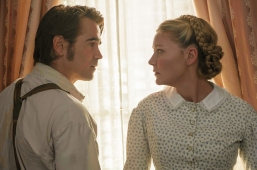29/07/17
Traverse Theatre, Cambridge Street, Edinburgh
We’re meeting up with some old friends and we’ve been meaning to try Dine for a while now, so it seems like the ideal time to give the place a whirl. Since we’re eating fairly early, we have the opportunity to select from the market menu, which comes in at a very reasonable £19.50 for three courses. Michelin-starred chef Stuart Muir claims to have created a series of contemporary twists on classic dishes and our expectations are high.
The room above the Traverse theatre is a delightful setting for a meal: it’s spacious and circular with dark wooden flooring, giving a surprisingly intimate feel; the tables are arranged around a central and remarkably realistic apple tree. The staff are friendly and chatty – attentive without being obtrusive. Drinks are duly ordered and the starters arrive promptly.
I opt for the cured sea trout, which, though not the most photogenic thing on the menu, is really quite delicious, served with pickled green apple, burnt cucumber, yoghurt and dill. Susan has the heritage tomatoes, which are bursting with flavour, nestling on goats cheese, black olive crumb, filo and basil. Our companions go for the smoked Ayrshire ham hock terrine with carrot chutney, pickled heritage carrots, watercress and sourdough. It looks splendid but I’m not offered a taste, no matter how many hints I drop!
The main courses are equally assured. Susan’s Perthshire chicken is agreeably moist and succulent, served with sweetcorn puree, burnt sweetcorn, baby gem and pickled trompettes. I sample the (very alliterative) braised brisket of borders beef (try saying that with a mouthful of garden peas!), served with truffle polenta cake, burnt onion puree and tender steam broccoli. Brisket is notoriously hard to get right, but this is as tender as you’d want, and coated with a sticky, piquant sauce. A slice of this meat nestled on a chunk of polenta cake makes for a very pleasing contrast. Excellent.
Puddings? Well, Susan orders the Blacketyside farm strawberries – these come with mascarpone, meringue, 12-year-old balsamic, basil and a scoop of strawberry sorbet. It’s a pretty spectacular concoction, hitting all the sweet notes in perfect harmony. I go for the selection of British cheese, with crackers and a rich, fruity chutney. Since cutting down on dairy products in my everyday diet, this is a chance to be a bit decadent and the three cheeses I’m served are generously proportioned and lip-smackingly good. (Had I been a bit more organised I’d have made a note of their names, but I was too busy devouring them to take time out to do that, so suffice to say that Dine does excellent cheese.)
This was fine dining prepared to a very high standard, offered at a very reasonable price in a charming location. Any way you look at it, it ticks all the boxes. With the madness of the fringe only days away, make sure you book early to avoid disappointment.
4.6 stars
Philip Caveney


























